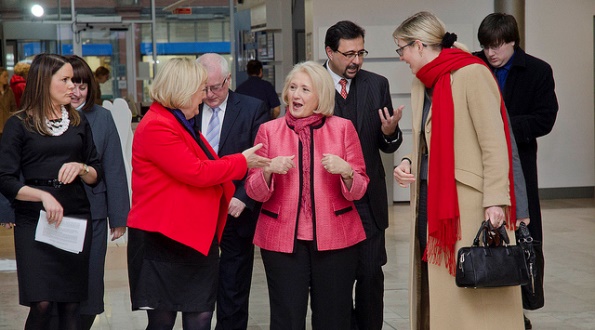BECOME A MEMBER
>JOIN
Madame Ambassador: The Growing Power of Women Diplomats in Washington

Today’s debate topic: If women ran the world, would they do a better job?
That seems to be the consensus on Capitol Hill, where a group of female senators are credited with crafting a compromise deal that could end the shutdown and avoid a default. “If it were up to the women, this would be over already,” Democratic Sen. Maria Cantwell told MSNBC. “There’s still a lot of testosterone going around.”
For the negative: Novelist Margaret Atwood, who famously argued that “If all women are well-behaved by nature — or if we aren’t allowed to say otherwise for fear of being accused of anti-femaleism — then they are deprived of moral choice. . .To put it another way: Equality means equally bad as well as equally good.”
But the intrinsic comity of women was the prevailing sentiment Monday when a small group of A-list diplomats, businesswomen and power brokers —former Secretary of State Madeleine Albright, Democratic Leader Nancy Pelosi, former protocol chief Capricia Marshall, East Wing chief of staff Tina Tchen— joined together at Georgetown University to honor women ambassadors posted to the United States.
Ambassador Melanne Verveer — Hillary Clinton’s former chief of staff, state department official for global women’s affairs and now executive director of Georgetown’s new Institute for Women, Peace and Security — hosted 15 of the 29 female ambassadors currently serving in Washington. The evening had all the trappings of traditional male privilege: A fancy dinner in the university’s historic Riggs Library, but a guest list of all women — except for the lone male, Georgetown president John DeGioia. “Two decades ago,” he said, “a gathering like this would not have been possible.”
Albright gave a short but charming pep talk: When she first arrived at the United Nations in 1993, she asked her staff to invite all the other female representatives to lunch. Six women showed up. They dubbed themselves the “G-7” and promised to always return each other’s calls. Developing a support system, she told the crowd Monday, is “a very important part of the work. It gets a little bit easier — but not always.”
The dinner included the two longest serving female ambassadors to the U.S.: Liechtenstein’s Claudie Fritsche and Congo’s Faida Mitifu, plus the rookie in the crowd: new Irish ambassador Anne Anderson, the first woman from her country named to head the embassy in D.C.
“In all the big questions we’re confronted with globally. . .women are at the core of that,” Anderson told her colleagues. “Yes, of course, we may be victims in many situations, but we are also authors of the solutions.”
Originally published by The Washington Post.
Photo by University of Ulster.

